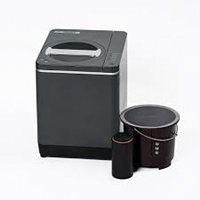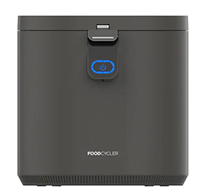FoodCycler Pilot Program
The Town of Carleton Place has partnered with Food Cycle Science to implement a waste diversion Pilot Program by offering a FoodCycler™ at a reduced rate to interested residents.
The diversion of food and organic waste away from landfill is one way that communities like Carleton Place can significantly reduce household emissions of CO2e that contribute to climate change. The purpose of this Pilot Program is to measure the viability of onsite food waste processing technology as a method of waste diversion the Town can use to meet its environmental goals, provide residents with another tool to reduce their household's carbon footprint, and extend the life of landfill facilities.
The FoodCycler™ is an electric appliance that offers in-home, countertop processing of food waste that is comparable in CO2e emissions to central composting (minus transportation costs and emissions) and backyard composting (if done correctly). Regular use of the appliance should not cost more than $4 per month in electricity and offers a >95% reduction in CO2e emissions compared to sending food waste to landfill.
Resident Guide
Food Cycle Science has created this guide as a resource to you during your participation in the Pilot Program. In the following pages, you will find an FAQ section, a list of items you can process with your FoodCycler™️ and a table you can use to track the number of cycles done with the FoodCycler™️ over the pilot period.
Carleton Place FoodCycler™️ Resident Guide
Application for the FoodCycler™ Pilot Program
In the Spring of 2023, the Town will be offering 450 Carleton Place households the opportunity to participate in a 12-week Pilot Program by providing the household with one (1) FoodCycler™ unit (one (1) per household) at a reduced rate as a partnership with Food Cycle Science, the Federal Government, and the County of Lanark. This year, the Town will be offering a limited number of two (2) different model options. The FC-30 model (225 units) and the Eco 5 model (225 units). The chart below can help you decide which model would be better for your household.
 |
 |
|
| FC-30 | Eco 5 | |
| Cost to Resident | 150+ HST = $169.50 | 255.56+ HST = $288.78 |
| Bucket Capacity | 2L | 5L |
| Unit Volume | 30.5L | 28.9L |
| Dimensions (IN") | (H) 14 x (W) 11 x (D) 10.3 | (H) 13.8 x (W) 13.8 x (D) 10.3 |
| Progress Indicators | 3-Phase LED | Progress Tracking LEDS |
| Processing Time | 4-8 Hours (Overnight) | 6-8 Hours |
| Power Consumption | <0.40KWh/L | <0.35 KWH/L |
| Filtration | 2 Reusable Filters | 1 Reusable Filter |
| Vent Location | Back | Top |
| Transmission Torque | 12 FT LBS | 24 FT LBS |
| Household Size | 1-2 people | 3+ |
After the 12-week pilot period, a mandatory survey, which includes a usage report, is required to be completed by participants.
Once your registration has been received, the Program Administrator will contact you via email to arrange for payment and pickup of your unit.
We will begin accepting applications for the Pilot Program in the Spring of 2023 by application form at the bottom of this page. Sign up for our e-newsletter CP Scoop or follow us on Facebook to be notified when the application period opens.
